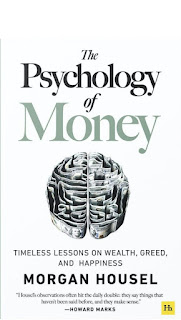🌟 The Psychology of Money by Morgan Housel – Unlock the Secrets to Wealth, Happiness, and Financial Success
Money is a tool, but how we think about it—and how we behave around it—has a much bigger impact on our financial lives than we realize. The Psychology of Money by Morgan Housel dives into the emotional and psychological side of personal finance. It helps us understand not just the technical aspects of money management, but the deep-rooted human behaviors and biases that often determine our financial outcomes.
✨ The Core Idea
At its core, The Psychology of Money argues that financial success is more about how you behave than how smart you are. It's about developing the right mindset, being patient, avoiding costly mistakes, and understanding the way emotions shape our decisions. Housel blends insightful stories with personal finance wisdom to show us how we can make better decisions and build wealth over time.
🔑 Key Lessons from The Psychology of Money
1. Wealth Is What You Don’t See
Most of us think of wealth in terms of expensive houses, flashy cars, and lavish vacations. But the real wealth is what’s hidden: savings, investments, and the ability to live below your means. Wealth is often invisible, and those who have it aren’t always the ones who flaunt it.
Try this: Instead of focusing on spending to keep up with others, think about building wealth quietly through saving and investing.
2. Compounding Works Wonders
In finance, compounding is like magic. When you invest money and allow it to grow over time, you’re not just earning interest on your original investment—you’re earning interest on the interest. This snowball effect can create massive wealth, but it requires patience and consistency.
Try this: Start saving and investing as early as possible. Even small contributions can grow significantly over time thanks to the power of compounding.
3. Risk and Luck Are Part of the Equation
No one can predict the future, and success often comes down to a mix of luck and risk. Housel emphasizes that while we should take risks, we also need to understand that luck plays a large role in financial outcomes. Those who are successful might not always be the smartest—they might just have been lucky.
Try this: Acknowledge that sometimes success is about being in the right place at the right time. Take risks, but also be prepared for the unpredictable.
4. The Power of Independence
Financial independence is one of the greatest forms of freedom. When you have enough wealth, you no longer have to rely on others, and you can make choices based on what’s best for you, not what’s most profitable.
Try this: Focus on building your wealth in a way that allows you to have more independence in your life, whether that means having more time, fewer obligations, or the freedom to do what you love.
5. Don’t Compare Your Financial Life to Others
We often compare ourselves to others, but in personal finance, that’s a dangerous game. Everyone’s situation is different, and success isn’t always visible. Avoid comparing your financial journey to someone else’s, as you never know the full story behind their wealth.
Try this: Concentrate on your own financial goals and avoid looking at what others are doing. Remember, everyone’s journey to wealth is unique.
🧠 A Powerful Story from The Psychology of Money
One of the most memorable stories in the book is about Richard Fuscone, a wealthy executive who once had it all: a big house, fancy cars, a lucrative job. But after losing his fortune, Fuscone had to make a dramatic shift in how he viewed money. He realized that money wasn’t the ultimate goal—it was about having freedom and peace of mind.
Fuscone’s story shows us that wealth isn’t just about numbers; it’s about aligning your life with your values and seeking true freedom, not just possessions.
🔚 Final Takeaway
The main lesson from The Psychology of Money is that wealth isn’t just about the money itself—it’s about how you think about money, how you behave around it, and how you make decisions over time. Patience, humility, and the ability to learn from both success and failure are what will guide you toward financial freedom and happiness.
💬 Quick Action Step
Take a moment to reflect on your financial habits and mindset. Are you living for the moment or planning for the future? Challenge yourself to think about wealth in terms of long-term growth and independence, rather than immediate gratification or comparison to others.
📝 Should You Read The Psychology of Money?
Yes! The Psychology of Money offers powerful insights into how our emotions and behaviors influence our financial decisions. It’s not just a book about money—it’s a book about the mindset that leads to long-term success, happiness, and freedom. If you want to make smarter financial decisions and avoid common mistakes, this book is a must-read.








0 Comments